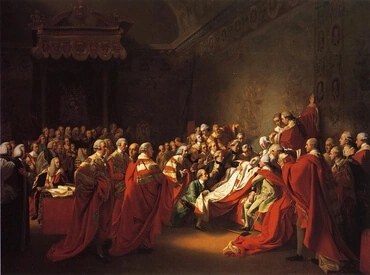1
And the messenger who is speaking with me doth turn back, and stir me up as one who is stirred up out of his sleep,
2
and he saith unto me, `What art thou seeing?' And I say, `I have looked, and lo, a candlestick of gold -- all of it, and its bowl [is] on its top, and its seven lamps [are] upon it, and twice seven pipes [are] to the lights that [are] on its top,
3
and two olive-trees [are] by it, one on the right of the bowl, and one on its left.'
4
And I answer and speak unto the messenger who is speaking with me, saying, `What [are] these, my lord?'
5
And the messenger who is speaking with me answereth and saith unto me, `Hast thou not known what these [are]?' And I say, `No, my lord.'
6
And he answereth and speaketh unto me, saying: `This [is] a word of Jehovah unto Zerubbabel, saying: Not by a force, nor by power, But -- by My Spirit, said Jehovah of Hosts.
7
Who [art] thou, O great mountain Before Zerubbabel -- for a plain! And he hath brought forth the top-stone, Cries of Grace, grace -- [are] to it.'
8
And there is a word of Jehovah to me, saying,
9
Hands of Zerubbabel did found this house, And his Hands do finish it, And thou hast known that Jehovah of Hosts Hath sent me unto you.
10
For who trampled on the day of small things, They have rejoiced, And seen the tin weight in the hand of Zerubbabel, These seven [are] the eyes of Jehovah, They are going to and fro in all the land.'
11
And I answer and say unto him, `What [are] these two olive-trees, on the right of the candlestick, and on its left?'
12
And I answer a second time, and say unto him, `What [are] the two branches of the olive trees that, by means of the two golden pipes, are emptying out of themselves the oil?'
13
And he speaketh unto me, saying, `Hast thou not known what these [are]?' And I say, `No, my lord.'
14
And he saith, `These [are] the two sons of the oil, who are standing by the Lord of the whole earth.'







